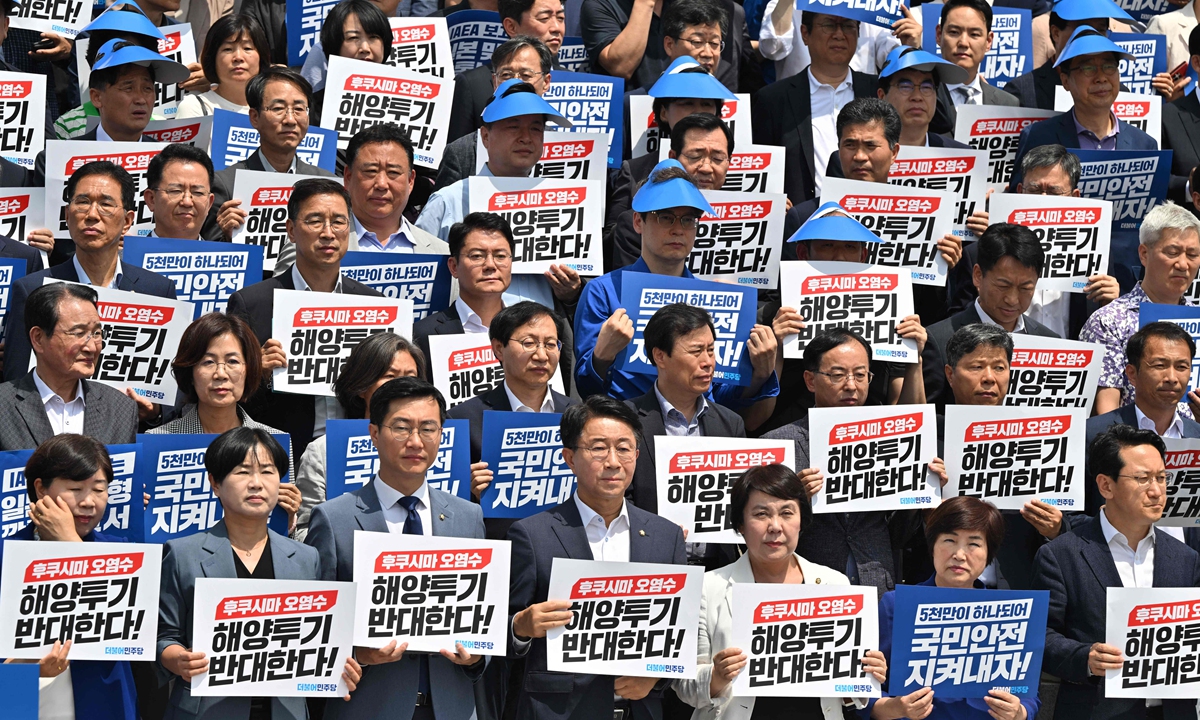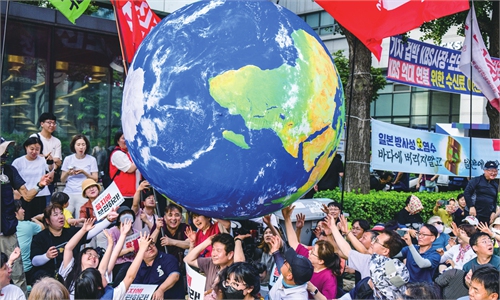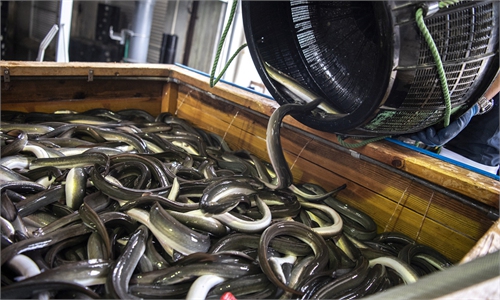S.Korea largest opposition party to visit Japan to hold back latter from dumping nuclear-contaminated wastewater

South Korea's main opposition Democratic Party lawmakers and party members hold placards reading "We oppose the dumping of Fukushima contaminated water into the sea" during a rally against Japan's plan to release treated water from the Fukushima nuclear plant, at the National Assembly in Seoul on July 7, 2023. Photo: VCG
Burgeoning anger and criticism from South Korea on Japan's plan to dump nuclear-contaminated wastewater into the ocean cannot be ignored, as not only a large-scale rally from civil groups were once again organized over the weekend, but officials from Democratic Party (DP), the main opposition party in South Korea, will visit its neighboring country soon with the aim to hold back the Japanese government from carrying out the controversial plan.
The DP has been consistent in its critical stance of Japan's dumping scheme. Talking to the visiting by the head of International Atomic Energy Agency (IAEA) to Korea, 's, DP floor leader Woo Won-shik slammed the UN nuclear watchdog chief's verification of the plan as "biased in favor of Japan from the beginning, losing its neutrality and objectivity." It is a merely "self-verification" and "a Japan-tailored investigation" that lacks proper investigations into the impact of the dumping plan on neighboring countries, Woo was quoted by Yonhap as saying.
Large-scale protests coincided with the visit of Rafael Mariano Grossi, director general of the IAEA, to South Korea on the weekend which was aimed at calming fears.
Holding blue balloons shaped like whales and placards with slogans saying "oppose the discharge of radioactive water," hundreds of protesters took to the streets of Seoul on Saturday to express their strong criticism and opposition over Japan's dumping plan from its tsunami-hit Fukushima plant, the fourth large-scale protest since May, the Xinhua News Agency reported.
On Sunday, protesters stood in the rain and held signs saying "No Fukushima Nuclear Radioactive Wastewater from Japan!" in front of the National Assembly, Yonhap reported.
A group of 11 DP lawmakers and other activists intend to visit Japan to urge the Japanese government to revoke the plan, according to the Korea JoongAng Daily.
They will travel to Japan with four people representing South Korean fishermen and they plan to hold a rally in front of the Japanese prime minister's official residence, protest at the IAEA office in Japan, and hold a sit-in in front of the Japanese parliament.
In sharp contrast, the administration of South Korean President Yoon Suk-yeol has continued its fine line in its stance to Japan's dumping plan. South Korean Foreign Minister Park Jin's words to Grossi when they met on Saturday afternoon neither supported nor opposed the dumping of the radioactive water. Park was seeking the IAEA's cooperation in verifying the safety of the water and addressing public concerns during his meeting with Grossi on Saturday, according to Yonhap.
The welcome accorded to Grossi and allowing him to state how the IAEA backs Japan's dumping plan in reality shows Yoon's administration is in "complicity" with Japan, even though South Korea will be one of the biggest victims, Lü Chao, an expert on Korean Peninsula issues at the Liaoning Academy of Social Sciences, told the Global Times. "The ambiguous attitude from South Korea emboldens Japan to go ahead with its plan."
South Korea is coordinating with Japan to hold a meeting between their leaders on the sidelines of a NATO summit in Lithuania next week, Reuters reported, citing a South Korean presidential official.
Lü said the dumping plan is likely to be discussed if they meet as Yoon wishes to boost the national economy by improving relations with Japan. "Political needs have taken the better of the Yoon administration," he said.
Lü believes Seoul's compromising attitude exposes that Yoon's administration opts to take sides that cater to the US as Yoon places more weight on the collusion of South Korea and Japan as important links of the "Asia-Pacific Strategy" than an incident that is about to harm the global environment, the expert noted.



